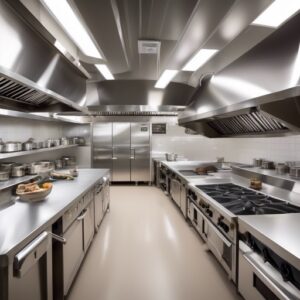A restaurant’s kitchen is its beating heart, where culinary dreams are born and flavors come to life. Yet, over time, even the most efficient kitchens can become outdated or inefficient, hindering the workflow and compromising the quality of dishes served. Kitchen remodeling is a vital investment for any restaurant looking to stay competitive and enhance its operations. In this article, we’ll explore three essential tips for restaurant kitchen remodeling that can help transform your culinary space into a hub of efficiency and creativity.
Assess Your Current Workflow and Needs
Before embarking on any remodeling project, it’s crucial to assess your current kitchen workflow and identify areas for improvement. Take the time to observe how your kitchen operates during peak hours, paying close attention to bottlenecks, inefficient layouts, and equipment deficiencies. Engage with your kitchen staff to gather insights into their daily challenges and suggestions for improvement. Consider factors such as food preparation areas, storage space, traffic flow, and ergonomics.
Conduct a thorough inventory of your existing equipment and fixtures, noting their condition and functionality. Determine which items need upgrading, replacement, or relocation to optimize space utilization and workflow efficiency. Investing in modern, energy-efficient appliances can not only streamline operations but also reduce long-term maintenance costs and environmental impact.
Additionally, consider future growth and expansion plans when designing your new kitchen layout. Anticipate changes in menu offerings, dining trends, and technological advancements to ensure that your remodeled kitchen remains adaptable and future-proof.
Prioritize Safety and Compliance
Safety should be paramount in any restaurant kitchen, and remodeling presents an opportunity to enhance safety measures and ensure compliance with health codes and regulations. Consult with experts in food safety and sanitation to identify potential hazards and implement preventive measures during the remodeling process.
Pay special attention to ventilation systems, fire suppression equipment, and emergency exits to mitigate the risk of kitchen accidents and ensure a safe working environment for your staff. Install durable, easy-to-clean flooring materials that provide slip resistance and withstand heavy foot traffic.
Compliance with local building codes and health regulations is non-negotiable for any restaurant operation. Work closely with architects, engineers, and regulatory authorities to obtain the necessary permits and approvals for your remodeling project. Failure to adhere to these requirements can result in costly delays, fines, or even closure of your establishment.
Optimize Efficiency and Sustainability
In today’s competitive restaurant industry, efficiency and sustainability go hand in hand. A well-designed kitchen can maximize productivity while minimizing waste and energy consumption. Incorporate eco-friendly design principles and practices into your remodeling plans to reduce your environmental footprint and operating costs.
Consider installing energy-efficient lighting fixtures, such as LED bulbs, and motion sensors to control usage based on occupancy levels. Upgrade to water-saving faucets, dishwashers, and pre-rinse spray valves to conserve water without compromising performance. Implement recycling and composting programs to divert food waste from landfills and promote a culture of sustainability among your staff.
Efficiency extends beyond equipment and utilities to the layout and organization of your kitchen space. Design a streamlined workflow that minimizes unnecessary movement and maximizes productivity. Group similar tasks together to create designated work zones for food prep, cooking, plating, and cleaning. Invest in ergonomic workstations and storage solutions to reduce strain and fatigue among your kitchen staff, ultimately improving morale and retention rates.
Conclusion
Kitchen remodeling Forth Worth your restaurant kitchen is a significant investment that requires careful planning, attention to detail, and a commitment to excellence. By following these three essential tips—assessing your current workflow and needs, prioritizing safety and compliance, and optimizing efficiency and sustainability—you can transform your culinary space into a hub of creativity, productivity, and success. Embrace the opportunity to reinvent your kitchen and elevate your dining experience for both customers and staff alike.


